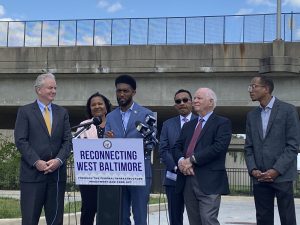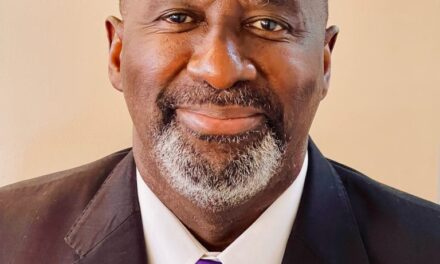By Tashi McQueen,
AFRO Political Writer,
tmcqueen@afro.com
Rep. Kweisi Mfume met with Baltimore City Mayor Brandon M. Scott and U.S. Senators Chris Van Hollen (D-Md.) and Ben Cardin (D-Md.) to discuss plans to redevelop West Baltimore’s “Highway to Nowhere” using a $2 million federal investment.
“The partial construction of this highway resulted in the demolition of 971 homes and 62 businesses and almost 1,500 people were displaced,” said Mfume. “Where we stand was once a connected, thriving community that has been separated for decades due to this monstrosity.”
Scott added further context to the depth of the issue in West Baltimore.
“We are talking about a highway built to nowhere in what was a thriving, middle-class Black community in West Baltimore,” said Scott. “When you take out that kind of wealth—family-owned businesses, people that were doctors, teachers and lawyers—purposefully, what else do you expect to happen?”
Scott said outright that the highway and policies related to the infrastructure were racist.
Federal lawmakers secured this funding through the U.S. Department of Transportation’s Reconnecting Communities Program, an initiative the team created within the Infrastructure Investment and Jobs Act.
The Maryland legislators announced that Mayor Scott and his team will be leading planning for the initiative.
“We are now going to turn the page and show [that] you can take something that is a testament of how not to operate for your community and turn it into a thriving neighborhood,” said Scott.
Scott then announced that Corren Johnson, interim director of the Baltimore City Department of Transportation, in particular, will spearhead planning.
“We’re currently working with the federal partners to develop the grant agreement. It will take a couple of months for us to get that going,” said Johnson. “Then we’re going to follow through on the remaining stages.”
Johnson also announced that this summer, applications will open up for a stakeholder workgroup, one of the first opportunities for the community to get involved in the process.
“We are specifically not saying what it’s going to look like because we don’t want to dictate,” said Johnson. “We’re going to be part of the process, but we want to hear from the community.”
Mfume said he hopes the plan, under Scott’s direction, will “bring forth a future including public park land, community, recreational and environmental spaces, bike trails, outdoor entertainment and leisure activity space.”
Community member Edna Manns-Lake, president and founder of Fayette Street Outreach, said she came to the announcement in efforts to learn what legislators would do about the “Highway to Nowhere.”
“I needed to hear what they’re gonna do because it’s been a long time coming,”Manns-Lake. “I grew up in this area. When I found out about the ‘Highway to Nowhere’ displacement, I was so sad because I saw that as having taken away the unity of the community.”
“I want legislators to help us rebuild this area as promised,” continued Manns-lake. “It will help us draw more jobs, bring us closer and help us to have more quality of life.”
Related articles:
op-ed-repair-our-communities-or-else
New-initiative-aims-to-heal-divide-caused-by-west-baltimores-infamous-highway-to-nowhere
Bi-partisan-infastructure-bill-passes
harlem-park-community-assc-working-to-restore-neighborhood
The post Maryland leaders discuss next steps in ‘Highway to Nowhere’ appeared first on AFRO American Newspapers .











